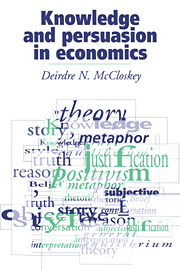Book contents
- Frontmatter
- Contents
- List of figures and tables
- Preface
- Acknowledgments
- Part I Exordium
- Part II Narration
- Part III Division
- Part IV Proof
- Part V Refutation
- 14 The very idea of epistemology
- 15 The tu quoque argument and the claims of rationalism
- 16 Armchair philosophy of economics
- 17 Philosophy of science without epistemology: the Popperians
- 18 Reactionary modernism: the Rosenberg
- 19 Methodologists of economics, big M and small
- 20 Getting “rhetoric”: Mark Blaug and the Eleatic Stranger
- 21 Anti-post-pre-metamodernism: the Coats/McPherson/Friedman
- 22 Splenetic rationalism, Austrian style
- 23 The economists of ideology: Heilbroner, Rossetti, and Mirowski
- 24 Rhetoric as morally radical
- Part VI Peroration
- List of works cited
- Index
19 - Methodologists of economics, big M and small
Published online by Cambridge University Press: 01 February 2010
- Frontmatter
- Contents
- List of figures and tables
- Preface
- Acknowledgments
- Part I Exordium
- Part II Narration
- Part III Division
- Part IV Proof
- Part V Refutation
- 14 The very idea of epistemology
- 15 The tu quoque argument and the claims of rationalism
- 16 Armchair philosophy of economics
- 17 Philosophy of science without epistemology: the Popperians
- 18 Reactionary modernism: the Rosenberg
- 19 Methodologists of economics, big M and small
- 20 Getting “rhetoric”: Mark Blaug and the Eleatic Stranger
- 21 Anti-post-pre-metamodernism: the Coats/McPherson/Friedman
- 22 Splenetic rationalism, Austrian style
- 23 The economists of ideology: Heilbroner, Rossetti, and Mirowski
- 24 Rhetoric as morally radical
- Part VI Peroration
- List of works cited
- Index
Summary
It has been hard for some philosophers of economics, then, to understand the rhetorical turn. Likewise the philosophically influenced economist-Methodologists, such as Mark Blaug, A. W. Coats, or Roger Backhouse, have had a difficult time reading. Like the philosophers they evince a lack of curiosity about the revolution in science studies, which may explain their difficulties. An article by Backhouse entitled “The Constructivist Critique of Economic Methodology” (1992b, chiefly a review of work by Roy Weintraub and myself) does not mention among fifty-five citations any sociologist or historian of science, aside from the lone and usual apotropaic reference to the Kuhn of The Structure of Scientific Revolution. So Backhouse and the other economist-philosophers are of course puzzled by the metamodern claim that science is a matter of communities.
Backhouse's puzzled response to my work is a good instance of how some philosophers and their students claim to speak for all time, yet make like the rest of us a rhetorical use of a time-bound community of speech. Backhouse uses the tu quoque popular among philosophers in the here and now yearning for the Last Judgment: “It is not possible to take such communities as ‘given,’ obviously recognizable, for this goes against the premise that there are no uninterpretable givens” (Backhouse 1992b, p. 73).
- Type
- Chapter
- Information
- Knowledge and Persuasion in Economics , pp. 265 - 279Publisher: Cambridge University PressPrint publication year: 1994
- 1
- Cited by



